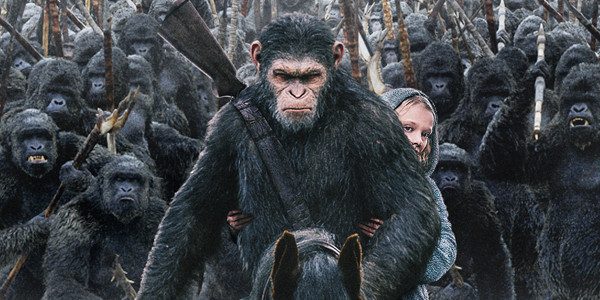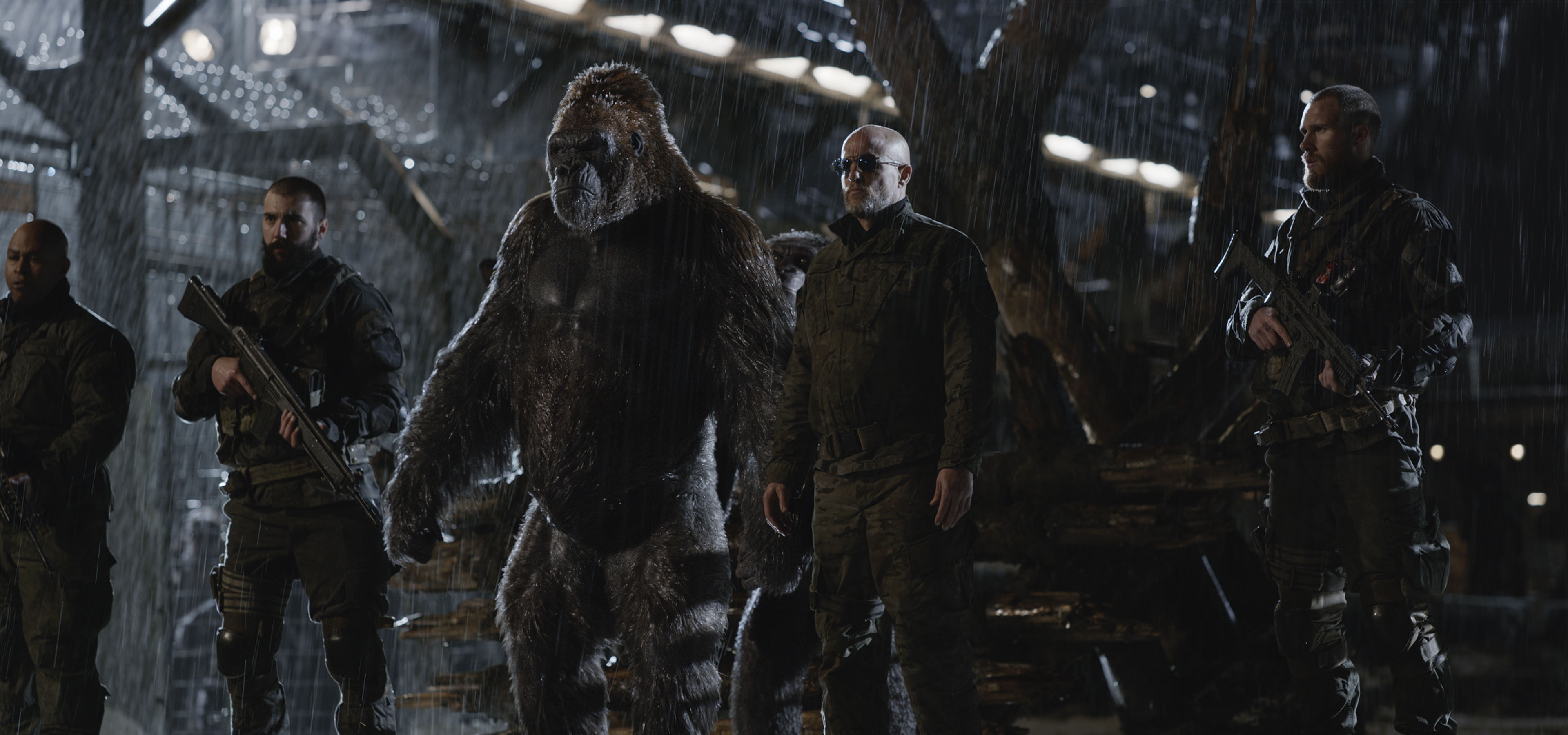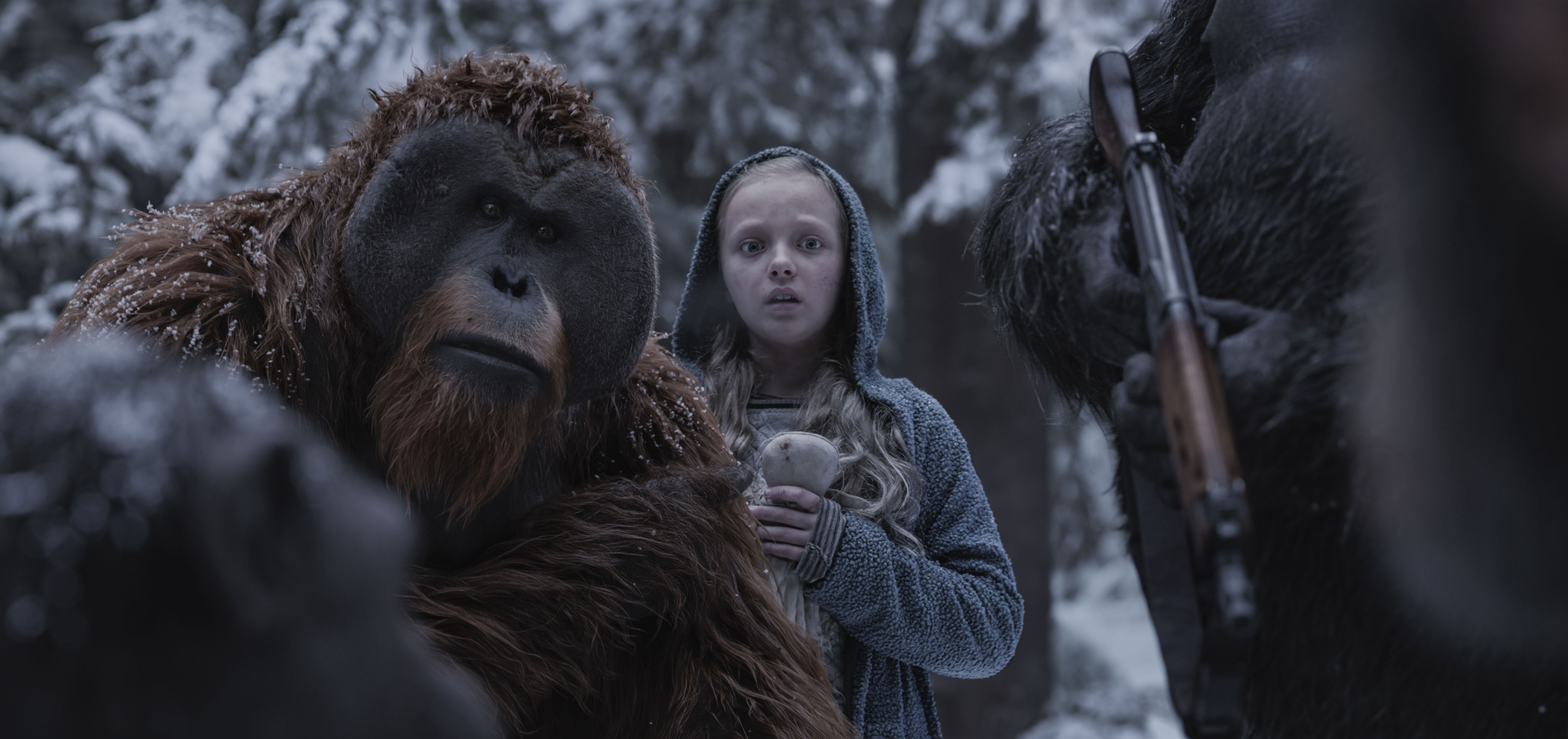CHICAGO – In anticipation of the scariest week of the year, HollywoodChicago.com launches its 2024 Movie Gifts series, which will suggest DVDs and collections for holiday giving.
‘War for the Planet of the Apes’ Delivers Old Hollywood Glory
 Rating: 4.5/5.0 |
CHICAGO – Since the Golden Age of cinema, theaters have tried countlessly to deliver up big budget films. Summer is here and the public is showing that they are cooling off these blockbusters, no longer fooled by the thought that cost equates to quality. “War for the Planet of the Apes” shows us that blockbusters may still be redeemed by channeling some Old Hollywood magic.
There is a nostalgic quality that Matt Reeves injects into the “Planet of the Apes” mythos in this prequel trilogy, but it becomes much more apparent in the closing entry that is “War for the Planet of the Apes”. Reeves borrows elements, both cinematic and narrative, from the big budget Hollywood films of old and gives the film a well-earned sense of grandeur. Together, screenwriters Mark Bomback and Matt Reeves turn this tale about apes into an epic of “King Kong” proportions.

Sometimes evolution favors a different species in ‘War for the Planet of the Apes’
Photo credit: 20th Century Fox
The story is one we have encountered in nearly every possible genre throughout the entire lifetime of film. It is a tale of survival, revenge, redemption and war. The only difference is that it is a story about the survival of a species that is not the human race; the more interesting part being that we are rooting for the collapse of humanity and the perseverance of a group that is considered our evolutionary cousins. “War of the Planet of the Apes” is a genre chameleon that is always adapting to new story lines or plot twists in order to keep the viewer in a constant state of attention, never allowing them to feel the over 2-hour runtime.
As we travel through the different genres, the film turns into a tour of thematic elements. It starts off as a New World story, showing the humans as invaders and evoking heavy comparisons to American Colonialism. The film quickly shifts into a revenge film with our protagonists on horseback as they look for justice, which is essentially the backbone of every Western story. Scattered throughout the film, there are flourishes of 80’s war film influences, with the most obvious being “Apocalypse Now” (including the clever, in-film pun “Ape-pocalypse Now”). These themes have skillfully coalesced, but in the end, they are merely used to support the film’s all-encompassing religious comparison to the plight of the Jews.

A peaceful existence is worth fighting for in ‘War for the Planet of the Apes’
Photo credit: 20th Century Fox
Caesar is given the role of Moses, meant to lead his people to the promised land. Along the way, they encounter many obstacles and even face enslavement. This elicits stark imagery of Ancient Egyptian slavery combined with the more recent concentration camps of the Holocaust. This savior story not only mirrors the history of Judaism but also points out the film’s biggest cinematic influence: “The Ten Commandments”. Reeves pays homage to this epic film, and all the others like it, by using its narrative approach, pacing and even tone as the lifeblood of the film. Having this solid skeletal structure in place, he is able to play with and marry other elements and genres together, making something new out of something old and something borrowed.
One aspect that made “War” such a captivating cinematic experience was the soon-to-be Oscar nominated score from composer Michael Giacchino (“Up”, “Ratatouille”). Next to surreally life-like, CGI-captured apes, this score is able to accentuate the emotions of each character and set the tone for every scene. Giacchino’s musical influence in each scene verges on the manipulative, tugging on our heart strings or tensely pushing us closer to the edge of our seats. Usually, this form of tonal persuasion is seen as a cheap gimmick when it is used in the place of good storytelling, but in the case of “War for the Planet of the Apes”, it is used with a purpose. Every emotion the score tells you to feel is meant to heighten the journey this film transcends into. Giacchino’s score is also on par with the Old Hollywood aesthetic Reeves is channeling and ends up adds more authenticity to the film’s homage status.

Can two species so similar coexist? Find out in ‘War for the Planet of the Apes’
Photo credit: 20th Century Fox
Every element of this film resonates in complete harmony with all the moving parts, including the CGI-heavy motion captured magnificence of the apes. Pioneer Andy Serkis delivers another powerful performance as Caesar, the film’s hero. Every role Serkis plays becomes a transformative experience for him. We witness him not only play the character but physically become them, mannerisms, voice and all. Along with Steve Zahn and Judy Greer, Andy Serkis wears the brunt of his character’s emotions through his expert expressiveness, giving them a natural life. This creates a beautiful counter-balance to Zahn’s comic relief and Woody Harrelson’s scenery chewing. This is just another example of how seemingly dichotomous elements have come together to make a brilliant amalgam known as “War for the Planet of the Apes”.
 | By JON ESPINO |


